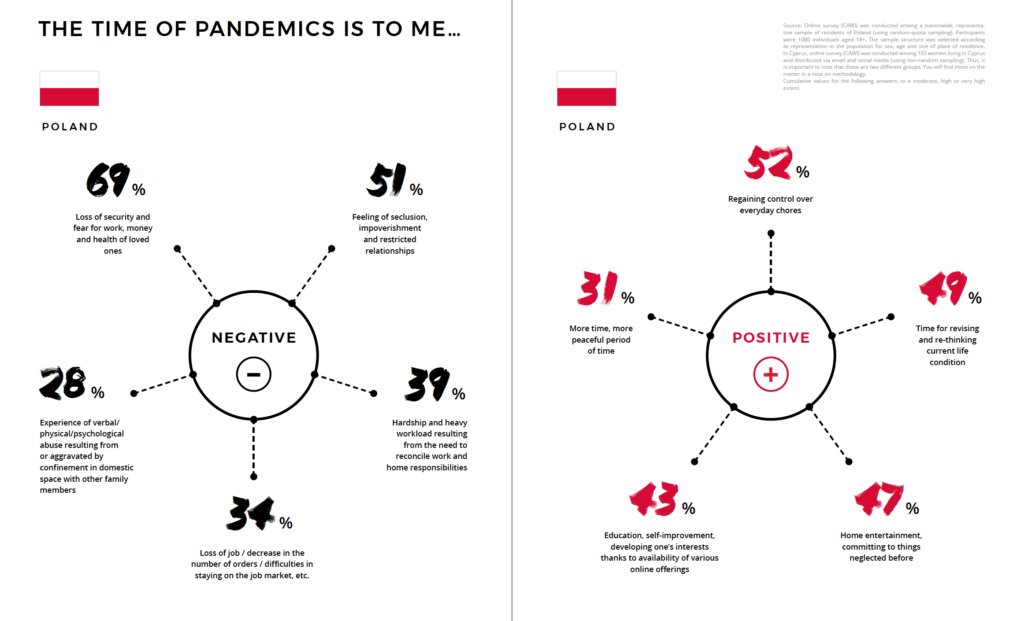Impact of the Covid-19 pandemic on women in Poland and Cyprus
The impact of crises is never gender-neutral, and Covid-19 is no exception, claimed Marry Robinson, former United Nations Commissioner for Human Rights, a year ago. Today, we have abundant evidence that the consequences of the still ongoing pandemic, to a greater extent and on many dimensions, have and will continue to have a more negative impact on women than on men.

The time od pandemics is…
The pandemic has exacerbated the already existing inequalities concerning – for example – unequal distribution of household responsibilities, and has hindered previously growing trends of women’s empowerment in professional life.
For almost 70% of women surveyed by infuture.institute in Poland, as well as for women in Cyprus, the pandemic means – above all – a loss of security and fear for work and the health of their loved ones. For almost half of the Polish women and almost 40% of the Cypriot women surveyed, it is also a sense of loneliness and impoverished relationships.
The concept od the Neurological Levels Pyramid by Robert Diltis
It refers to six dimensions that affect people’s everyday functioning. We asked respondents about the impact of the pandemic on their values, behaviour, capabilities, emotions, identity and spirituality. This holistic view was intended to help develop conclusions that include a broader insight into the changes that the pandemic has caused and their impact on women.

Additionally, our qualitative research investigated individual stories of women who shared their experiences and reflections from the past months. These complement the report in the form of anonymous quotes. As part of the general research, we also analysed the already available studies and reports. This allowed us to draft the main conclusions and theses resulting from the research process.
Under the discussion of each thesis, the report also features suggestions for next steps and recommendations for actions to be taken. We sincerely hope that the effects of the pandemic, visible in so many aspects of life, properly addressed and publicised will empower women to act and become a contribution to systemic change and a breakthrough time for women.

matter in a note on methodology. Cumulative values for the following answers: to a moderate, high or very high extent.
Women’s empowerment trends slowed down
- The pandemic has slowed down trends in the empowerment of women, both in society and in the labour market, that had been on the rise the previous few years.
- There has been a return to the social roles culturally ascribed to women: carers, keepers of the home self-sacrificing mothers.
- The pandemic has had a negative impact on women’s well-being, emotions and feelings. It intensified their fears for their loved ones, and shook their sense of security.
- The pandemic has highlighted the increased need for support in combating psychological and physical violence, as well as cyberbullying against women.
- There’s a call for a systemic change in the perception, but also in the financial appreciation of the work and jobs that have been crucial to society during the pandemic, and in which the over-representation of women is clearly visible.
- The impact of the pandemic is multi-level and multifaceted, thus it is important to perceive the effects and consequences of covid-19 that have affected women in a holistic manner.
A note of methodology
The publication is the aftermath of a Polish-Cypriot seminar on opportunities, threats and challenges for the development of new technologies in the face of the Covid-19 pandemic. The event took place on 25 May 2021 and was organized by the Embassy of the Republic of Poland in Nicosia, with the support of KGHM Polska Miedź S.A., and in collaboration with the Cyprus Chamber of Commerce and Industry and the Polish-Cypriot Chamber of Commerce.
Therefore, both Polish and selected female Cypriot participants took part in the survey. The aim of the study was to assess the impact of the Covid-19 pandemic on different areas of women’s functioning in Poland and in Cyprus. The methodology that was used to conduct it was inspired by the concept of the Pyramid of Neurological Levels. We based our research on six levels and spheres of a person’s functioning, which include emotions (feelings, psychological well-being), behaviour(work, duties, tasks), capabilities (knowledge, skills, competences), identity (who a person is, life roles), and spirituality (vision and sense of meaning in life).
The research project ran from May to June 2021. It was based on both quantitative and qualitative research methods and consisted of several modules:
- we used publicly available reports and public statistics for desk research analysis;
- we conducted a survey among the Instagram community with more than 30 users sharing their experiences during the pandemic;
- female experts from Cyprus and Poland shared their thoughts and observations on the impact of the pandemic on women;
- an online survey (CAWI) was conducted among a nationwide, representative sample of Polish women and men (using random-quota sampling), with N=1080 persons aged 18+. The sample structure was selected according to re-presentation in the population for sex, age and size of place of residence;
- an online survey (CAWI) was conducted among 103 women living in Cyprus, distributed via email and social




